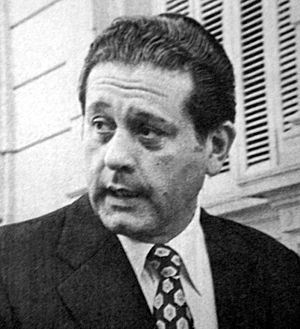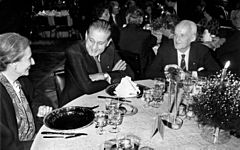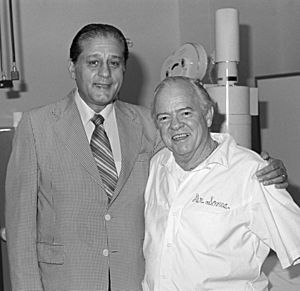René Favaloro facts for kids
Quick facts for kids
René Favaloro
|
|
|---|---|

Favaloro in 1976
|
|
| Born |
René Gerónimo Favaloro
July 12, 1923 La Plata, Argentina
|
| Died | July 29, 2000 (aged 77) Buenos Aires, Argentina
|
| Alma mater | National University of La Plata |
| Years active | 1949–2000 |
| Spouse(s) | María Antonia Delgado (1951–1998) |
| Parent(s) | Juan Manuel Favaloro and Geni Ida Raffaeli |
| Awards | Prince Mahidol Award (1998), Order of the Sun of Peru (1973), Order of Merit of the Italian Republic (1978), Canada Gairdner International Award (1987), Golden Plate Award (1993), Konex Award (1993) |
| Signature | |
 |
|
René Gerónimo Favaloro (born July 12, 1923 – died July 29, 2000) was an amazing Argentine heart surgeon and teacher. He is famous for creating a new way to do coronary artery bypass surgery. This surgery helps people with heart problems.
Contents
Early Life and Education
René Favaloro was born in 1923 in La Plata, Argentina. His family came from Sicily, an island in Italy.
In 1936, he started high school at the Rafael Hernández National College. After that, he went to medical school at the National University of La Plata.
During his third year, he began working at the Hospital Policlínico San Martín. This hospital treated very serious cases from all over Buenos Aires province. Here, he learned a lot from his professors about how to do surgeries simply and effectively. He earned his medical degree in 1949.
After medical school, Favaloro moved to a small town called Jacinto Aráuz. He became the town's doctor. He worked hard with his brother, Juan José, to make health care better for everyone there. They set up an operating room, X-ray equipment, and a better laboratory. This helped them provide important medical care. He married María Antonia Delgado in 1951.
Discovering Heart Surgery
René Favaloro became very interested in heart surgery. He visited his old professor, José María Mainetti, who told him about the Cleveland Clinic in the United States. Favaloro decided to go there, even though he had little money and spoke only a little English.
At the Cleveland Clinic, he first worked as a resident. Later, he joined the surgical team. He worked with important doctors like Donald B. Effler and F. Mason Sones, Jr.. Dr. Sones had the biggest collection of heart angiograms (special X-rays of blood vessels) in the U.S.
Favaloro spent many hours studying these angiograms. He wanted to understand how coronary arteries worked with the heart muscle.
The Bypass Surgery Breakthrough
In 1967, Favaloro had a brilliant idea. He thought about using a vein from the leg, called the great saphenous vein, to bypass blocked heart arteries. This meant creating a new path for blood to flow around the blockage.
He performed this surgery for the first time in May 1967. This new method, called coronary artery bypass surgery, changed how doctors treated heart disease. It made him famous around the world. In 1970, he wrote a well-known book about this surgery.
The Favaloro Foundation

In 1971, Favaloro returned to Argentina. He wanted to create a medical center like the Cleveland Clinic. This center would focus on patient care, research, and teaching.
So, in 1975, he started the Fundación Favaloro (Favaloro Foundation). He was proud to have trained over 450 doctors from Argentina and other countries in the Americas. The Foundation held many courses and conferences to improve medical care.
In 1980, Favaloro started a research laboratory. He often paid for it with his own money. This lab later became part of the Universidad Favaloro, a university he founded in 1998.
In 1992, the Favaloro Foundation opened its Institute of Cardiology and Cardiovascular Surgery in Buenos Aires. Its motto was "advanced technology in the service of medical humanism." This means they used the best technology to help people with kindness. The institute offers specialized care for heart problems, heart surgery, and organ transplants (like heart, lung, liver, and kidney).
Favaloro always believed in helping everyone, even those who couldn't pay. He performed surgeries daily on patients who were poor. He also focused on preventing diseases and teaching people about good hygiene. The Favaloro Foundation is now one of the biggest heart institutions in the Americas.
Recognition and Legacy
René Favaloro passed away on July 29, 2000, at 77 years old.
Many people honored him for his work. Another heart surgeon, Denton Cooley, said that Favaloro was the one who truly brought coronary bypass surgery into common use. Favaloro was a member of many medical societies and received countless awards from around the world.
Some of his important awards include:
- The John Scott Prize in 1979.
- The Gairdner Foundation International Award in 1987.
- The René Leriche Prize in 1989.
- The Gifted Teacher Award in 1992.
- The Golden Plate Award in 1993.
- The Diamond Konex Award in 1993, for being the most important scientist in Argentina in his decade.
- The Prince Mahidol Award in 1999, from the King of Thailand.
In 2007, he was named the second-greatest Argentine of all time on a TV show. On July 12, 2019, Google honored him with a special Google Doodle on what would have been his 96th birthday.
Favaloro on Television
René Favaloro also helped educate the public. He appeared in a TV series called The Great Medical Themes. He also gave many talks in Argentina and worldwide about medicine, education, and modern society. He was mentioned in the documentary movie Forks Over Knives.
His Books
René Favaloro wrote over 300 papers about his medical work. He also loved history and wrote two books about a famous Argentine general, José de San Martín.
Some of his books include:
- Surgical Treatment of Coronary Arteriosclerosis (1970)
- Recuerdos de un médico rural ("Memories of a rural doctor", 1980)
- ¿Conoce usted a San Martín? ("Do you know San Martín?", 1986)
- La Memoria de Guayaquil ("The memory of Guayaquil", 1991)
- De La Pampa a los Estados Unidos ("From La Pampa to the United States", 1993)
- Don Pedro y la Educación ("Don Pedro and education", 1994)
See also
 In Spanish: René Favaloro para niños
In Spanish: René Favaloro para niños
 | James Van Der Zee |
 | Alma Thomas |
 | Ellis Wilson |
 | Margaret Taylor-Burroughs |


